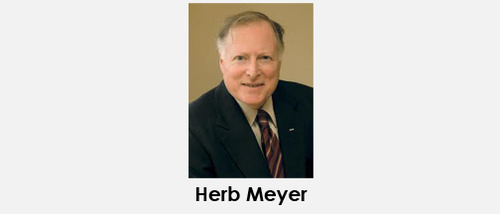
I love people who make me think by seeing the world in a different way. Herb Meyer is one of those people. As the former #2 in Reagan’s CIA his job was to be Reagan’s “radar,” to see things before they appear. Among other things, Herb was the first person to predict the demise of the old Soviet Union. I heard him talk a few days ago and I was mesmerized for three hours. I would now like to share a few of his thoughts.
Meyer had three main themes:
- The world is getting modern— The laggard of course is the Islam world. What we fail to realize, according to Meyer, is that the Islam world works under a different operating system than the West’s. It will take years, but eventually the majority of that world will modernize. Maybe not to the West’s standards but there will be measurable progress.
- The world is getting richer— Every year, 50-100 million people are crossing the poverty line. 7 out of 10 of the world’s fastest growing economies are in sub-Saharan Africa. There is an emerging middle class all over the world. They watch TV, have smart phones, buy homes, go to movies, etc. It is hard to hate people who are like you, and more importantly it is harder to start wars and fight them.
- The world is getting older— I’d like to focus on this area since it fascinates me. To understand where Meyer is coming from you need to be aware of two key metrics: 1) that a country needs a birth rate of 2.1 children to every 2 adults in order to sustain population levels, and 2) that any country falling below the 1.3 birth rate is considered on suicide watch (they cannot recover), OK, now consider this:
A. Western Europe’s birth rate is 1.5. In 25 years there will be 70-80 million less Europeans.
B. Italy and Spain are at 1.2. In 25 years they will loose 20% of their working population
C. In Italy, 64% of all Italians under 35 have never held a job and the vast majority live with their parents. An entire generation lost.
D. In Germany, 40% of college age women are childless.
E. In Europe only 1 out of 7 couples are married.
F. In short, many Europeans do not like to make babies, marry, or work.
G. Muslims are an increasing part of the European population.
H. In England, the most popular boy’s name last year was Muhammad.
I. In France, 30% of the population under 20 is Muslim.
J. In Europe, the fastest growing crime is fathers killing their daughters for disobeying orders to marry within their faiths.
K. Israel’s birth rate is 3. In 25 years there will be more people in the Israeli army than in Germany’s.
L. In Japan, by 2020 1 out of 5 of its citizens will be over the age of 70.
M. Japan is closing 400 schools a year.
N. In Japan, the largest diaper manufacturer is selling more adult diapers than baby diapers.
O. Russia is in dire straits and not just economically. The average male lives to 57, alcoholism is still rampant, and their population is aging commensurate with Western Europe.
P. China’s birth rate is 1.1 due to their one-child per couple policy. The vast majority are boys. China is very worried about what 200 million single men with no chance of getting married will mean to the stability of the country. China also has the most rapidly aging population on earth and few women caregivers.
Q. The country to watch is India. Highly educated, high birth rates, democratic, believes in property rights and the rule of law. Israel and Mexico are also in good shape.
So what does this all mean for marketers?
- These changes will not happen overnight but the trend lines are clear. Dismiss them at your own risk.
- Older people do not spend money like younger people. That is why advertisers want to reach the 35-50 age demographic.
- Key growth industries will be medical/health care, financial services, travel and hospitality.
- Messaging must be tailored to the audience more than ever before. For example, you are not going run an ad in Italy aimed at 30 year olds saying, “tired of your job? Treat yourself to…..”
- Marketers planning to launch new baby products will give more emphasis to India, Africa and parts of North America. Western Europe may become forgotten except for fast growing ethnic areas.
- It is fair to say that world powers will change dramatically in the next 20-30 years.
As a wise marketer once told me some years ago, “Don, the only thing we can expect is change.” Our job is to have our radar working, analyze the facts objectively and then to lead our business (and country) forward.